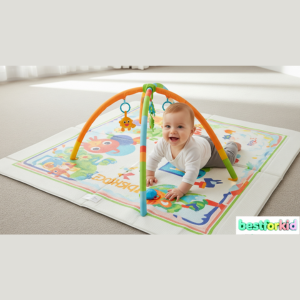
Welcome to the beautiful, whirlwind journey of parenthood! As you cuddle your little one, their health and safety become your top priority. One of the very first and most important steps you will take to protect them is ensuring they receive their baby’s first vaccinations. This guide is designed for you, the loving Indian parent, to navigate the world of childhood immunisation with confidence. We understand you have questions, and we are here to provide clear, simple answers. Following the recommended vaccination schedule is a powerful act of love, creating a shield that will guard your child against serious diseases for years to come. Think of it as the first of many gifts you will give your baby for a long and healthy life.
Why Your Baby's First Vaccinations are a Shield of Protection
Vaccines are one of the greatest success stories in modern medicine. They are a safe and incredibly effective way to protect your child from a host of preventable diseases. Understanding how they work can help ease any worries you might have. It’s a simple yet brilliant process that prepares your baby’s body for future battles against germs.
How Do Vaccines Work? It’s Like a Training Exercise!
Think of a vaccine as a training session for your baby’s immune system. Vaccines introduce a tiny, harmless part of a germ—either a weakened or killed version—to the body. This is not enough to make your baby sick. However, it is enough for their immune system to recognize the germ as an intruder. In response, the body creates special soldiers called antibodies. These antibodies are like a memory bank; they learn how to fight off that specific germ. Therefore, if your child is ever exposed to the real, harmful disease in the future, their immune system will know exactly what to do. It will quickly deploy the right antibodies to fight the infection, preventing your child from getting sick or ensuring the illness is much milder.
The Power of Community: Understanding Herd Immunity
When you vaccinate your child, you are not just protecting them. You are also protecting the entire community. This concept is called herd immunity or community immunity. When a large percentage of the population is vaccinated, it becomes very difficult for a disease to spread. This is crucial for protecting the most vulnerable among us. This includes tiny newborns who are too young for some vaccines, children with weakened immune systems due to illnesses like cancer, and other individuals who cannot be vaccinated for medical reasons. Your decision to vaccinate contributes to a circle of protection around everyone.
Protecting Against Serious Diseases
It’s easy to forget how dangerous some childhood diseases can be because vaccines have made them so rare. However, illnesses like measles, polio, tetanus, and whooping cough can cause severe complications. These complications can include paralysis, brain damage, blindness, and even death. Your baby’s first vaccinations are a critical defense against these devastating outcomes. Newborns and infants have developing immune systems, which makes them especially vulnerable to severe infections. Vaccinating on schedule provides them with protection when they need it most.
Navigating the Indian Baby Vaccination Schedule: Birth to 18 Months
In India, the vaccination journey is well-structured to provide your baby with timely protection. The government of India runs the Universal Immunisation Programme (UIP), a flagship initiative that provides many essential vaccines free of cost at government health centers. Additionally, the Indian Academy of Paediatrics (IAP) provides a comprehensive schedule that includes some optional, yet highly recommended, vaccines. It’s important to keep a vaccination card and bring it to every doctor’s visit to track your child’s immunisations. Here is a breakdown of the typical vaccination timeline for a baby in India.
At Birth: The Very First Shots
Your baby’s journey to immunity begins right after birth, often before you even leave the hospital. These first vaccines are crucial for early protection.
- BCG (Bacillus Calmette-Guerin): A single dose given to protect against tuberculosis (TB), a serious lung disease.
- Oral Polio Vaccine (OPV – 0 Dose): This is the first dose to begin protection against polio, a virus that can cause paralysis.
- Hepatitis B (Hep-B 1): The first of three doses to protect against Hepatitis B, a viral infection that affects the liver.
At 6 Weeks: The First Big Round
This is a significant milestone in your baby’s vaccination schedule. Several vaccines are given to start building a strong defense.
- DTwP / DTaP 1: The first dose protecting against Diphtheria (sore throat, breathing trouble), Tetanus (lockjaw), and Pertussis (whooping cough).
- IPV 1 (Inactivated Polio Vaccine): An injectable polio vaccine that further strengthens polio protection.
- Hib 1 (Haemophilus influenzae type b): The first dose to prevent serious infections like meningitis and pneumonia.
- Rotavirus 1: The first dose of an oral vaccine that protects against rotavirus, a common cause of severe diarrhea and vomiting in infants.
- PCV 1 (Pneumococcal Conjugate Vaccine): The first dose to guard against pneumococcal bacteria, which can cause meningitis, pneumonia, and blood infections.
At 10 Weeks: Boosting the Defenses
This visit builds upon the foundation laid at 6 weeks. Your baby will receive the second doses of several important vaccines.
- DTwP / DTaP 2 (Second Dose)
- IPV 2 (Second Dose)
- Hib 2 (Second Dose)
- Rotavirus 2 (Second Dose)
- PCV 2 (Second Dose)
At 14 Weeks: Strengthening Immunity
The third round of shots further solidifies your baby’s immunity against several key diseases, making their protection more robust.
- DTwP / DTaP 3 (Third Dose)
- IPV 3 (Third Dose)
- Hib 3 (Third Dose)
- Rotavirus 3 (Third Dose)
- PCV 3 (Third Dose)
From 6 to 9 Months: New Protections
As your baby grows, new vaccines are introduced to widen their shield of protection against other common illnesses.
- Influenza (Flu Shot): Recommended annually for children over 6 months old. The first time, your baby will need two doses, one month apart. This protects against seasonal flu.
- Typhoid Conjugate Vaccine (TCV): Protects against typhoid fever, a bacterial infection spread through contaminated food and water. This is typically given between 6 and 9 months.
- MMR 1: The first dose of the vaccine protecting against three common childhood diseases: Measles, Mumps, and Rubella. This is given at 9 completed months.
At 12 to 18 Months: Toddler Boosters
As your little one enters toddlerhood, booster shots and new vaccines are needed to maintain and enhance their immunity.
- Hepatitis A 1: The first dose to protect against Hepatitis A, another viral liver infection, is given at 12 months.
- PCV Booster: A booster dose of the PCV vaccine is given between 12 and 15 months to ensure long-term protection.
- MMR 2 & Varicella 1: At 15 months, your child gets the second dose of the MMR vaccine and the first dose of the Varicella vaccine, which protects against chickenpox.
- DTwP / DTaP Booster 1: The first booster dose for Diphtheria, Tetanus, and Pertussis is given between 16 and 18 months.
How to Prepare for Your Baby's Vaccination Appointment
A little preparation can make vaccination day much smoother and less stressful for both you and your baby. Knowing what to do before, during, and after the appointment can transform an anxious experience into a manageable one. Your calm and confident presence is the most comforting thing for your child.
What to Do Before You Go
Getting ready for the visit starts at home. First, make sure your baby is healthy. If they have a high fever or are seriously ill, call your doctor to see if you should reschedule. A mild cold or cough is usually not a problem. Next, read the information your doctor provides about the vaccines your child will receive. Write down any questions you have. There are no silly questions when it comes to your baby’s health. Also, remember to find and pack your baby’s immunisation record card. This is essential for the doctor to update. Finally, dress your baby in clothes that are comfortable and easy to remove, like a simple snapsuit. This makes it easier to access their thigh or arm for the injection.
Making the Process Smoother at the Clinic
During the appointment, your role is to be your baby’s comfort champion. Hold your baby firmly but gently on your lap. This helps them feel secure and keeps them still for the injection. Distraction is a powerful tool. Bring a favorite toy, a colorful book, or even use your phone to play a calming song or video. Your voice is also incredibly soothing. Talk or sing softly to your baby. Let them know everything is okay with a smile and calm demeanor. Many experts also recommend breastfeeding your baby during the vaccination. The combination of being held close, the sweet taste of milk, and the act of sucking is a highly effective pain reliever.
After the Shots: What to Expect and How to Comfort Your Baby
The time after the vaccination is all about comfort and care. It’s normal for babies to have some mild reactions as their bodies build immunity. Knowing what’s normal and how to manage it will help you stay calm and confident.
Understanding Common and Normal Reactions
Mild side effects are a sign that the vaccine is working and your baby’s immune system is responding. These reactions are usually temporary, lasting only a day or two. The most common side effects include:
- Redness, swelling, or soreness at the injection site. Sometimes, a small, hard lump may appear, which can last for a few weeks but is harmless.
- A mild fever (a temperature up to 102°F or 38.9°C).
- Irritability or fussiness. Your baby might cry more than usual.
- Sleepiness or feeling more tired than normal.
- A temporary loss of appetite.
Simple Ways to Soothe Your Baby
Your gentle touch and care are the best medicine for a fussy baby after their shots. Offer plenty of cuddles and comfort. If you are breastfeeding, your baby may want to feed more often, which is perfectly fine for both hydration and comfort. For the sore spot on their leg or arm, you can apply a cool, damp cloth to help reduce redness and soreness. If your baby has a fever, keep them comfortable but do not overdress or wrap them in heavy blankets. You can ask your pediatrician about giving a non-aspirin pain reliever like infant paracetamol. Always follow your doctor’s advice and check the correct dosage for your baby’s age and weight before giving any medication.
When Should You Worry? Red Flags to Watch For
Serious reactions to vaccines are very rare. However, it’s important to know the signs that require immediate medical attention. Contact your doctor or go to the nearest hospital if you notice any of the following:
- A very high fever, especially over 39°C (102.2°F) in a young baby.
- Signs of a severe allergic reaction (anaphylaxis), which can include hives, swelling of the face and throat, or difficulty breathing. This is extremely rare and usually happens within minutes of the vaccination.
- Unusual, high-pitched crying for several hours.
- A seizure (febrile seizure), which can sometimes be triggered by a rapidly rising fever.
Trust your parental instincts. If you are worried about how your baby is reacting, it is always best to call your doctor for advice.
Compulsory vs. Optional Vaccines: Making an Informed Choice
When you look at the vaccination chart, you’ll see vaccines listed as “compulsory” and “optional.” This can be confusing, but the distinction is straightforward. Compulsory vaccines are part of India’s Universal Immunisation Programme (UIP) and are provided free of charge by the government. Optional vaccines are those recommended by pediatric bodies like the IAP but may not be covered by the government program. However, “optional” does not mean unnecessary. These vaccines protect against other serious diseases.
What are Combination Vaccines?
To make the process easier and reduce the number of injections your baby needs, many vaccines are available in combination forms. A great example is the 6-in-1 vaccine, which combines protection against Diphtheria, Tetanus, Pertussis (whooping cough), Polio, Hib, and Hepatitis B all in a single shot. This means fewer pricks for your baby, which is less traumatic for everyone involved. These combination vaccines are proven to be just as safe and effective as giving the shots individually.
The “Painless” vs. “Painful” Vaccine Debate
You may hear your doctor talk about “painful” (DTwP) and “painless” (DTaP) vaccines. Both protect against Diphtheria, Tetanus, and Pertussis. The difference lies in the Pertussis (whooping cough) component. The “painful” DTwP contains the whole cell of the bacteria, while the “painless” DTaP contains only a part of it (acellular). The DTaP vaccine tends to cause fewer mild side effects like fever and local pain. However, both are safe and highly effective. The DTwP vaccine is the one typically provided in the government’s free program. You can discuss with your pediatrician which option is best for your baby and your budget.
A Look at Vaccination Costs in India
One of the biggest concerns for parents is the cost associated with vaccinations. The good news is that the Government of India provides crucial protection for free. Under the UIP, essential vaccines like BCG, OPV, Pentavalent (which includes DTP, Hep-B, and Hib), and Measles are available at no cost in government hospitals and health centers. For families who prefer to visit private clinics or opt for additional vaccines not covered by the UIP, there will be costs involved. These prices can vary significantly based on the city, the hospital, the brand of the vaccine, and whether it’s a single or combination shot. It’s always best to consult with your doctor for exact pricing.
Here is an estimated price range for some common vaccines in private settings in India:
- Pentavalent Vaccine (DTP-HepB-Hib): ₹550 – ₹800
- Pneumococcal Conjugate Vaccine (PCV): ₹1,500 – ₹3,800 per dose
- Rotavirus Vaccine: ₹600 – ₹1,500 per dose
- MMR (Measles, Mumps, Rubella): ₹150 – ₹600
- DTaP (Painless): ₹800 – ₹900 per dose
- Hepatitis A: ₹1,300 – ₹1,400 per dose
Addressing Common Myths About Baby Vaccinations
In the age of the internet, it’s easy to come across misinformation about vaccines. These myths can cause unnecessary fear and confusion for parents. Let’s clear up some of the most common myths with facts from medical experts.
Myth: Vaccines cause autism.
Fact: This is one of the most persistent and harmful myths. Numerous large-scale scientific studies around the world have found no link between vaccines and autism. The original 1998 study that started this fear was proven to be fraudulent and was retracted by the medical journal that published it. Autism is a complex genetic disorder, and the evidence overwhelmingly shows that vaccines are not a cause.
Myth: A baby’s immune system can’t handle so many vaccines.
Fact: A baby’s immune system is much stronger than you might think. From the moment they are born, babies are exposed to thousands of germs in their everyday environment. The antigens (the parts of germs that trigger an immune response) in vaccines are just a tiny fraction of what a baby’s immune system successfully handles every single day. Getting multiple vaccines at once does not overload the immune system; it simply trains it efficiently.
Myth: Natural immunity is better than vaccination.
Fact: While getting sick from a disease can provide long-lasting immunity, it comes at a very high price. A “natural” infection with a disease like measles could lead to pneumonia, brain damage, or death. A polio infection could cause permanent paralysis. Vaccines, on the other hand, allow the body to build immunity without having to suffer through the actual illness and its potentially life-threatening complications.
Myth: Vaccines contain harmful toxins.
Fact: Some parents worry about ingredients like aluminum or formaldehyde in vaccines. It’s true these are present, but they are in extremely tiny, safe amounts. These ingredients are added to keep the vaccine stable and effective. Your baby is exposed to much higher amounts of these substances naturally in the environment, and even in their diet (a pear contains more formaldehyde than a vaccine). Scientific bodies have confirmed that the amounts used in vaccines are safe.
Myth: Vaccine-preventable diseases aren’t serious anymore.
Fact: These diseases are rare today precisely because of widespread vaccination programs. If vaccination rates were to drop, these dangerous diseases could quickly make a comeback. We still see outbreaks of measles and whooping cough in communities where vaccination levels are low. As long as these diseases exist somewhere in the world, an unvaccinated child is at risk.
Frequently Asked Questions (FAQ)
What if my baby misses a vaccination dose?
Don’t panic. Just contact your pediatrician as soon as you realize a dose was missed. They will advise you on the best way to catch up on the schedule. It’s important not to delay further to ensure your baby gets protected.
Are vaccines 100% effective?
No vaccine is 100% effective, but they are very close. Most childhood vaccines are 90% to 99% effective at preventing disease. If a vaccinated child does get sick, the illness is almost always much milder and less dangerous than it would have been without the vaccine.
Can I breastfeed my baby right after vaccination?
Absolutely! Breastfeeding is highly recommended. It’s one of the best ways to comfort and soothe your baby immediately after a shot. The physical closeness and the act of sucking are natural pain relievers.
Is it safe to vaccinate a premature baby?
Yes, it is very important to vaccinate premature babies according to the standard schedule based on their actual birth date, not their due date. Premature babies are at a higher risk of complications from infections, so timely vaccination is crucial for their protection.
Why does my baby need multiple doses of the same vaccine?
Most vaccines require more than one dose to build strong, long-lasting immunity. The first dose starts the process, and subsequent doses act as boosters to strengthen the immune response, ensuring your child is fully protected.
Where can I get my baby vaccinated in India?
You can get your baby vaccinated at government hospitals and primary health centers, where many vaccines are provided for free under the UIP. Alternatively, you can visit private pediatric clinics and hospitals.
Conclusion: Your Partner in Your Baby's Health Journey
Making the decision to vaccinate your child is a profound act of love and responsibility. Your baby’s first vaccinations are the foundation of a healthy life, protecting them from diseases that once caused widespread suffering. By following the recommended immunisation schedule, you are giving your child a powerful shield that allows them to grow, play, and thrive safely. Remember, you are not alone on this journey. Your pediatrician is your most valuable partner. Always feel free to ask questions, share your concerns, and work together to make the best decisions for your child. By choosing vaccination, you are choosing a future of health and well-being for your precious little one. For more detailed information, you can also visit official government resources like RCH Portal, POSHAN Abhiyaan, and the National Health Mission Immunization Page.
You May Also Like

2025’s Best Baby Diapers in India Every Parent Should Know
Finding the right diaper can be a game-changer for both parents and babies. In this guide, we’ve rounded up the best baby diapers in India for 2025 that offer superior comfort, absorbency, and skin protection. Whether you’re looking for budget-friendly options or premium brands, this list helps you make the right choice for your little one’s needs.

Newborn Clothing Made Easy: Comfort Meets Practicality
Dressing your newborn doesn’t have to be complicated. This guide simplifies your shopping by focusing on clothes that are soft, breathable, and easy to wear. Discover top picks for rompers, onesies, and sleepwear that combine comfort with convenience—perfect for your baby’s delicate skin and your daily routine.

10 Best Baby Play Mats for Comfort, Safety & Entertainment
A good play mat offers more than just a soft surface—it encourages sensory development, tummy time, and safe play. We’ve curated the best baby play mats of 2025 that tick all the boxes: comfort, safety, durability, and design. Explore options that turn your floor into a fun and nurturing environment for your baby.







